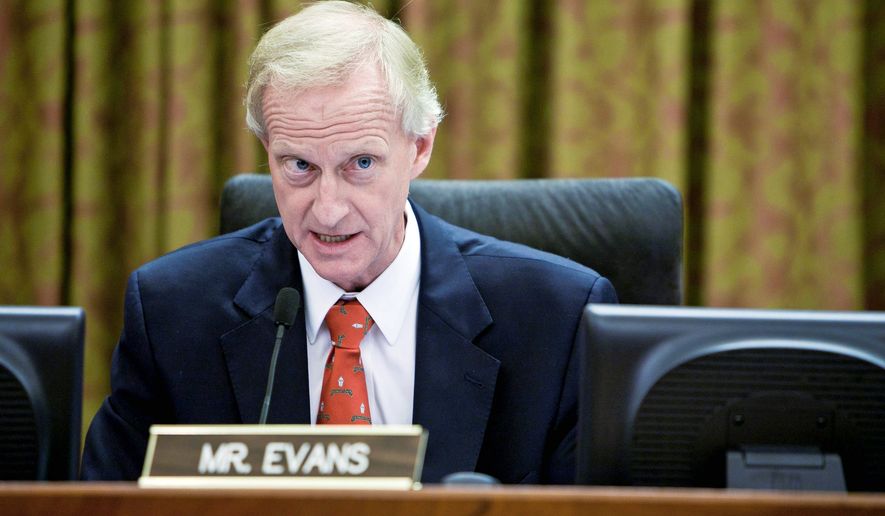D.C. lawmakers, advocates and business owners spent Thursday debating the finer points of the regulation and taxation of marijuana in the District, moving past what appears to be the foregone conclusion that voters Tuesday will approve legalization of the drug.
The views on legalized pot have shifted dramatically over the last year among city lawmakers, many of whom were initially wary of such an approach and opted to support the less controversial course toward decriminalization.
But polling shows a healthy majority of city residents are prepared to go the route of Colorado and Washington and fully legalize marijuana, which some estimates say could be a $130 million-a-year industry for the District.
“When I introduced the Marijuana Legalization and Regulation Act in September of 2013, none of my colleagues were willing to be co-introducers or co-sponsors,” D.C. Council member David Grosso, at-large independent, said at Thursday’s hearing on the bill.
At the time, medical marijuana distribution centers had only been selling their wares for a few months and it was unclear whether the council would pass a measure that sought to downgrade marijuana possession from a criminal offense to a civil one. (It did approve the decriminalization initiative and has since loosened restrictions making it easier for medical marijuana patients to access the drug.)
But the council, which now appears to broadly support legalization, is looking to work out the details of a regulatory scheme by which recreational marijuana can be sold, taxed and regulated.
SEE ALSO: DEBORAH SIMMONS: Just vote no on marijuana
“If the referendum passes on Tuesday, which I hope it does, the council will be in the position of having to set up a regulatory framework and taxing it will be part of that framework,” said D.C. Council member Jack Evans, Ward 1 Democrat who also oversaw Thursday’s hearing on the bill.
Initiative 71 would make it legal to possess up to 2 ounces of marijuana and for D.C. residents to grow up to six marijuana plants in their homes. But the ballot measure does not set up a scheme by which marijuana could be bought and sold, regulations the city would have to design.
A NBC4/Washington Post/Marist poll last month showed nearly two-thirds, or 65 percent, of D.C. residents plan to vote for the initiative, while 33 percent plan to vote against it. Just 2 percent were undecided.
Along with the District, voters in Alaska and Oregon will also see a marijuana legalization initiatives on their ballots Tuesday. But only the District’s initiative could face direct interference by Congress, which has oversight of city laws.
Rep. Andy Harris, Maryland Republican, tried to nullify the District’s decriminalization measure and has expressed similar interest in derailing the legalization effort if it is passed.
“The federal government should enforce federal law regardless of whether local citizens try to legalize marijuana,” Mr. Harris told The Hill this week. “If legalization passes, I will consider using all resources available to a member of Congress to stop this action, so that drug use among teens does not increase.”
SEE ALSO: Virginia will likely see stability in midterms
The legalization legislation would prohibit marijuana use for anyone under the age of 21.
While other states have championed legalization for the financial windfall that could follow, advocates who spoke in the District on Thursday spent more time stressing the social justice implications the bill could have — noting the higher frequency at which blacks are arrested for marijuana use than whites in the city.
But the fact the District could financially benefit from legalization was not lost on city officials.
The proposed legislation suggests a 15 percent sales tax on recreational marijuana and a lower 6 percent sales tax on medical marijuana.
Yesim Sayin Taylor, the District’s director of Fiscal and Legislative Analysis, admits his $130 million estimate of the potential marijuana industry’s worth is a rough one but said he based the figure on a potential 122,000 marijuana users, who consume 3 ounces of pot a year and purchase the drug for $350 an ounce.
Officials acknowledged the exact financial benefit for the city — the proceeds from marijuana sales would be directed to a fund separate from the city’s general fund for specific uses — is unknown, given that an excise tax might also be included.
“The goal here is to get rid of the underground market,” said Mr. Grosso, acknowledging that he’d like to see taxes set only high enough to pay for the regulation program. “This is not about a windfall for the District of Columbia.”
• Andrea Noble can be reached at anoble@washingtontimes.com.




Please read our comment policy before commenting.